In this blog, Mosharaf Hossain and Swati Nayak argue how farmers’ seed security can be enhanced through the promotion of a youth-led seed entrepreneurship model in Eastern India. They also highlight seed economics, and set forth the model’s scaling pathways.
BACKGROUND
The low productivity of Indian agriculture is a chronic issue but can effectively be addressed through, inter-alia, enhanced access to quality seeds of the best-fit varieties. Given the enormous economic and social significance of rice in the Indian state of Odisha, the low productivity of this principal staple remains a policy concern for the government. In the development discourse, farmers’ seed security (Box 1) is widely recognized as a tool for farm prosperity.
RICE IN ODISHA
Even though Odisha contributes 7% to the nation’s rice production, its productivity remains low at 2.1 tons per hectare against the national average of 2.7 tons per ha, and compares poorly vis-à-vis other agriculturally progressive states such as Punjab, Haryana, and Tamil Nadu. In Odisha rice is majorly a Kharif (wet season) crop grown in about 3.5 million hectares, requiring seeds of approximately 1.8 million quintals. However, rice being a self-pollinated crop, 33% seed replacement rate is the minimum prerequisite where seed sourced with assured qualities can be reproduced and grown for three subsequent years. This implies the state is in need of 6 lakh quintal certified or TL seeds every wet season. This is a humongous task and Odisha State Seed Corporation (OSSC) — the largest seed producer and distributor – cannot meet the demand singlehandedly. Approximately 3 lakh quintal quality certified seeds are produced and sold to farmers by OSSC every year, serving merely 50% of the total requirement. Noticeably, 5-6 varieties dominate this production and seed sale by OSSC. The remaining quantity is largely met through farm-kept seeds and private agencies. Since rice seed is a high-volume low-cost product, seed companies take less business interest in it; instead, they invest more resources towards breeding and marketing hybrid rice seeds that fetch them more revenue.
| Box 1: Seed security Seed security essentially encompasses five major inter-connected response areas — physical availability of seeds, farmers’ access, assured quality of the seeds, enough varietal choice for the farmers, and resilience of the seed system to ensure seed supply in the event of any socio-economic shocks (FAO 2008). Dimensions and importance of seed security can be better conceptualized through the diagram below. 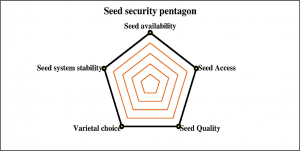 An ideal scenario, where full attainment of these dimensions exists, is always desired so as to augment the gain from all other improved farm technologies. An ideal scenario, where full attainment of these dimensions exists, is always desired so as to augment the gain from all other improved farm technologies.FAO and EU (2015). “Household seed security concepts and indicators” Discussion paper, https://www.fao.org/fileadmin/user_upload/food-security-capacity-building/docs/Seeds/SSCF/Seed_security_concepts_and_indicators_FINAL.pdf |
While on one hand, availability of quality seeds is not fully ensured, on the other, with fragile fragmented variety promotional activities, farmers’ choice of appropriate varieties is limited. Markedly, seed extension activities and seed sales are executed by different agencies without much convergence and integration leading to little scope for varietal knowledge and insight for farmers (Figure 1). Such shortcomings defeat the very purpose of boosting the adoption of well-researched rice varieties in the state. In such a situation, the tenets of seed entrepreneurship are unquestionably acknowledged, and strongly pursued in several seed-centric agricultural development programs.
 Figure 1: The current seed supply ecosystem
Figure 1: The current seed supply ecosystem
BASICS OF SEED ENTREPRENEURSHIP DEVELOPMENT
Promoting seed entrepreneurship is important primarily for two reasons. Firstly, it enhances the capacity of the formal seed sector. Secondly, it contributes to livelihood augmentation of seed growers. Local growers, when incentivized and supported, can take up seed business to cater to the unmet seed needs of the locality. This initiative will be even more rewarding when rural youths are encouraged and supported to start such seed businesses. The interested youths or farmers thus can be supported to be seed entrepreneurs. At the same time, it must be borne in mind that not all the youth or farmers should be targeted for seed entrepreneurship development, rather, a few from a locality with strong seed business interest can be carefully selected and assisted with all possible seed production support (Figure 2).
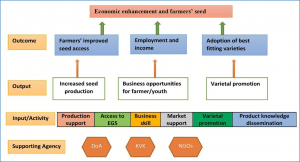 Figure 2: Seed entrepreneurship impact pathway
Figure 2: Seed entrepreneurship impact pathway
The COVID period showed us how fragile the livelihood options are for rural youth. India witnessed several cases of reverse migration and people struggling for a stable income source. At a time when the interest of youth in agriculture is on the wane but agriculture still remains the livelihood source for millions, it is very important to draw accord between interest, aspiration and available options. From a business point of view, such a venture – when properly run – is highly remunerative. A triangulation of business information from such manual enterprises suggests at least 50% profit margin on the invested amount.
| Box 2: Scope for seed entrepreneurship in Odisha’s rice sector In the Odisha context, promoting seed entrepreneurship assumes more socio-economic relevance, since there always exists a high demand for quality rice seeds and the presence of private companies (selling inbred seeds) is thin. Presently, the state government supplies seeds at a subsidized price of approx. Rs 22/kg, whereas the price is Rs 30-35 if procured from other sources. However, farmers are well-acquainted with the worth of seeds and they do not hesitate to pay a little more if the seed quality is better. Moreover, on average, a farmer requires to spend merely 4-5% of the total cost in seeds for inbred varieties. Thus the demand for good seeds always exists as farmers are constantly seeking quality seeds of better varieties. |
IRRI’S SUPPORT TO INCUBATING SMALL SEED ENTERPRISES
IRRI’s varietal advancement, seed out-scaling, capacity development initiatives in Odisha have created awareness and bridged the knowledge gap that earlier existed among many client groups.
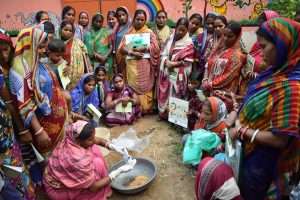 IRRI capacitating women farmers in Balasore, Odisha on quality rice seed production
IRRI capacitating women farmers in Balasore, Odisha on quality rice seed production
The story of budding seed entrepreneur, Mahendra Sahu, illustrates how IRRI is incubating small seed enterprises in Odisha. Remarkably, the 30-year old entrepreneur Mr Sahu (Box 3) did not just remain an insignificant recipient of knowledge and skill, but he rather went on to become a successful seed entrepreneur.
| Box 3: Mahendra Sahu Educated till higher secondary school, Mahendra lives with his parents at a small village in Bheden block of Odisha’s Bargarh district — one of the largest rice-producing districts in the state. His family owns five hectares of land with fairly assured irrigation facility. Mahendra, while being aware of various factors limiting the returns from farming, steadfastly believed that seed as a critical input can not only amend farming but could also be a source of decent earnings. With his strong zeal for seed and its advantages in farm profitability, he envisioned seed business as a career option. But he lacked three important ingredients to realize his dream: varietal knowledge and access; technical know-how for seed production; and market linkage. |
IRRI with its mandate of strengthening the seed system, has been rigorously working with state functionaries, community based organizations (CBOs), and farmers at Bargarh for quite a few years now. It was the wet season of 2018 when Mahendra participated in seed program activities and it kindled his latent urge for seed production and seed enterprise development. That year, IRRI enlisted him as a host farmer for their on farm trials, where climate-resilient and high-yielding varieties such as BRRI dhan 69, MTU 1156, BINAdhan 17, Swarna Shreya, DRR dhan 50, BINA dhan 11, were validated and advanced in a farmer-centric participatory framework.
“For the very first time, I got to see and test so many of the newest varieties in one single season. The superiority of these varieties and the assessment process employed by IRRI was indeed stimulating for me and helped me pick up some of the promising and viable products to start my seed business,” said Sahu in an interaction with IRRI staff.
In the next year, based on farmers’ preferences, ecological suitability, and duration fitment, he chose BRRI dhan 69, BINA dhan 11, and BRRI 75 to begin his journey as a seed entrepreneur. He kept seeds from his demonstration plots carefully to be used for seed multiplication in the next season.
The quality seed production program of IRRI was a huge support where Mahendra earned critical technical skills to maintain the quality standards of the produced seeds. In his own words, “The season-long systematic demonstration of production technology and elaborate focus on seed quality has greatly helped me to master the art of seed production. Before such exposure, I had no scientific idea about seed quality, but by now I have attended five IRRI-conducted QSP training to refresh and fine-tune my skills.”
In addition to conventional training, IRRI encouraged and supported him with varietal information, access to pure seeds for multiplication, low-cost seed storage materials, such as IRRI super bags, and also helped build market linkages with large seed producers to scale up his business.
Scale of business
In 2019, building on all these technical aids of IRRI and his strong seed-passion, he produced about 10 ton seeds of varieties such as BINA dhan 11, BINA dhan 17, and BRRI 75. These are newer varieties and best evaluated by farmers at IRRI trials, thus demand for the seed has sharply risen in the past two years. “There is huge demand for these varieties, I could meet only 10 percent of their demand,” Mahendra said. Farmers of 8-10 neighbouring villages are his current customers who often visit his village to procure the seeds. Against the market rate of Rs. 35-40 a kg for other commonly grown rice varieties, Mahendra sells his seeds at Rs. 55-60/kg because of high demand. Since his current production is not mechanized, he has to manually perform several operations — quality checks, grading, cleaning and drying.
In the following year, that is 2020, defying several operational challenges posed by the nationwide lockdown, he was able to produce 12 tons of seeds, and this time he added another IRRI-demonstrated variety, namely, BRRI dhan 69, which is the result of a cross border agreement catalysed by IRRI (developed originally in Bangladesh and later also released and notified in India) and has huge demand among farmers of the Bargarh region. With this quantity of sale, he served the seed needs of about 400 farmers who are predominantly marginal and small peasants with limited access to new varieties. With business at the core, Mahendra strives to offer farmers much help in terms of variety selection and quality seed procurement. Unlike many other seed sellers, Mahendra shares varietal information, and the key points of crop management with his farmer-customers.
The business model and benefits to farmers
On the production front, even though Mahendra has no mechanized setup yet for seed production, quality maintenance is the top focus of his business. He oversees and supervises all seed-to-seed operations so as to maintain quality standards. Moreover, his arduous exploration of new varieties gives him a competitive edge over others in product range and quality. For product promotion, he invites customer-farmers to his smaller demonstration and seed production plots letting them observe, assess the products, thus stimulating buyers’ purchasing decisions and the upshot is a growing customer relationship.
Another unique approach he is trying to embed in his business model is selling seeds with varietal insight. Unlike other traditional retailers, when farmers buy from him, he shares all varietal details, important management practices, etc. Quite understandably, all these qualities he has enhanced through his intensive engagement in IRRI activities for the last three years.
His seed economics
Mahendra has estimated the economics of seed production quite prudently and consistently making efforts to optimize cost for profit maximization. His business economics is straightforward arithmetic. If he grows rice as grain, it will get him a maximum margin of Rs 40,000 from a hectare, but if seeds are produced with a little extra effort, investment, and commitment meeting marketable quality standards, this profit margin can be at least thrice higher. “The essential practices like regular field inspection, eliminating seed mixtures, crop roughing, clean harvest, scientific harvest, and appropriate storage are all that make a huge difference to seed health,” said Mahendra, on his take on seed production challenges.
Imminent challenges
“I plan to produce more seeds of these varieties, but (I am) constrained with non-availability of pure seeds (early generation seeds), I must maintain the quality to make my customers happy,” are Mahendra’s words on being asked about his next year production planning. He has set an encouraging target to earn at least 5 lakhs per annum in the next 2-3 years with consistent improvement in production and marketing. However, the emergence and severity of diseases and pests pose a threat to a good seed harvest. The uncertainty in climate events (e.g., rain during harvest) also brings much misery to farmers in the area. Farmers need to be armed with the latest technologies so as to mitigate the impact of such weather shocks and increase farmers’ adaptive capacity.
Business enablers for Mahendra
IRRI extended three critical aids to Mahendra.
- The participatory trials and demonstrations of new varieties – ranging from climate-resilient, high yielders, and green super rice – have created awareness for the entire farming community in the catchment, and it fostered his business with increased demand.
- Venturing into the seed business without technical skills is a risky affair. Nonetheless, IRRI organized the QSP capacity-building program, helped him gather all seed production skills, and moulded him into a skilled seed grower.
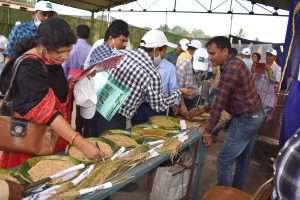
Mahendra Sahu at a variety cafeteria event organised by IRRI at Bargarh, Odisha
- IRRI’s support with pure/early generation seeds, storage materials, and local market insights catalyzed his seed business in terms of production and marketing. However, seed business cannot be everybody’s cup of tea, as, unlike the grain, seed production demands extra and precise care at all stages of crop production. A passion for seeds, entrepreneurial abilities, and unceasing devotion are the tricks of the trade and Mahendra has all these qualities.
The purpose and design of various IRRI demonstrations appealed to Mahendra and he found those are extremely catalytic to bridge the extension gaps in the transfer of technologies, like seeds. Interestingly, he is now replicating IRRI demonstration models such as varietal cafeteria, and cluster demonstration in his field to assess varietal performance. Interestingly, he is inviting farmers to visit his plots to get first-hand knowledge on several new varieties and to understand key management practices. He deliberates with farmers about the fitment and potential of varieties being displayed in his demonstration plots. He said, “I encourage farmers to evaluate and validate the performance of a variety as a pre-production practice before growing seeds of a new variety; it will make the sale easy.” In 2021, he included one more IRRI-bred variety — Swarna Samruddhi – in his production plan. This multi-stress tolerant, high yielder, with fitting grain quality will become a rage in that area, according to Mahendra. In this process, his exemplary efforts also manifested in creating mass awareness of new varieties among farmers.
In recognition of his impassioned entrepreneurial competencies for self-employment and meeting the seed need of farmers, AJKA, an NGO from Odisha, honoured and encouraged him with the Krushak Yodha (meaning ‘Farmer Warrior’) award. Dr Basant Kumar Mohanty, District Project Manager in the presence of the Chief District Agriculture Officer presented this award at an IRRI event organized at Bargarh in December 2021. IRRI, in the coming years, will encourage and support such entrepreneurs to advance the agenda of farmers’ seed security and economic development of rural entrepreneurs.
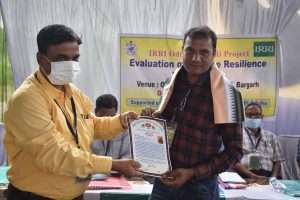 Recognition of Mahendra Sahu as a seed entrepreneur
Recognition of Mahendra Sahu as a seed entrepreneur
IMPLICATIONS FOR SCALING
Production support
This venture should initially be seen as a microenterprise with a clear vision of business modernization and expansion. Aspiring seed entrepreneurs should have comprehensive knowledge about rice ecosystems, varietal demand, recommendations, access to early generation seeds, new varieties, etc. They must be well-trained on techniques of quality seed production, seed cleaning, processing, and storage.
In the initial years, the small entrepreneur can run the production manually in case of capital constraints; however, eventually, a mechanized production unit can be planned to optimize production cost for scaling the volume and maximizing profit. It requires a sizeable investment, thus subsidized financial support will be greatly helpful.
Business support
Market scouting is a critical aspect of seed business since unsold seeds may need to be disposed of as grain at a much lower price. Pre-season assessment and agreement with the largest sellers are highly recommended to prepare production and marketing plans.
Seed quality
The biggest driver for seed business in the Odisha context is the quality standards of the seed. Consumers (farmers) rarely care about seed certification if they are convinced of the quality as experienced in their field. In fact, this quality aspect alone is crucial in building seed brand loyalty.
Expanded varietal choice
In light of inadequate varietal choices, such seed entrepreneurs can increase the number of well-fit varieties and give farmers a wider choice to pick their preferred varieties. While doing so the purposes of seed business are augmented and it also enriches farmers’ seed choice capabilities.
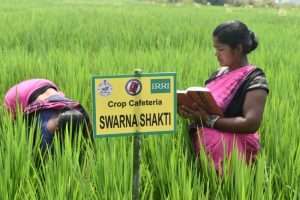 Women from a Sambalpur based SHG monitoring crop growth of a new rice variety demonstrated by IRRI
Women from a Sambalpur based SHG monitoring crop growth of a new rice variety demonstrated by IRRI
Varietal trials and seed extension activities
This is a very important part of the rice seed business that is hardly emphasized. Budding seed entrepreneurs should be a little more pro-consumer in terms of creating varietal knowledge and insights. Small-scale demonstration of the on-farm performance of new and old varieties, and encouraging farmers to participate and evaluate varieties can help in product selection as well as in converting farmers into customers. Furthermore, during seed retailing, farmers-buyers should be provided with basic product knowledge along with standard management practices, maybe as verbal suggestions and a leaflet. Such initiatives will progressively help entrepreneurs expand their customer base and scale up the business.

Sk Mosharaf Hossain – Specialist – Seed System and Product Management, IRRI India (Email: s.hossain@irri.org )

Swati Nayak – Scientist and South Asia Lead – Seed System and Product Management, IRRI (Email: s.nayak@irri.org)

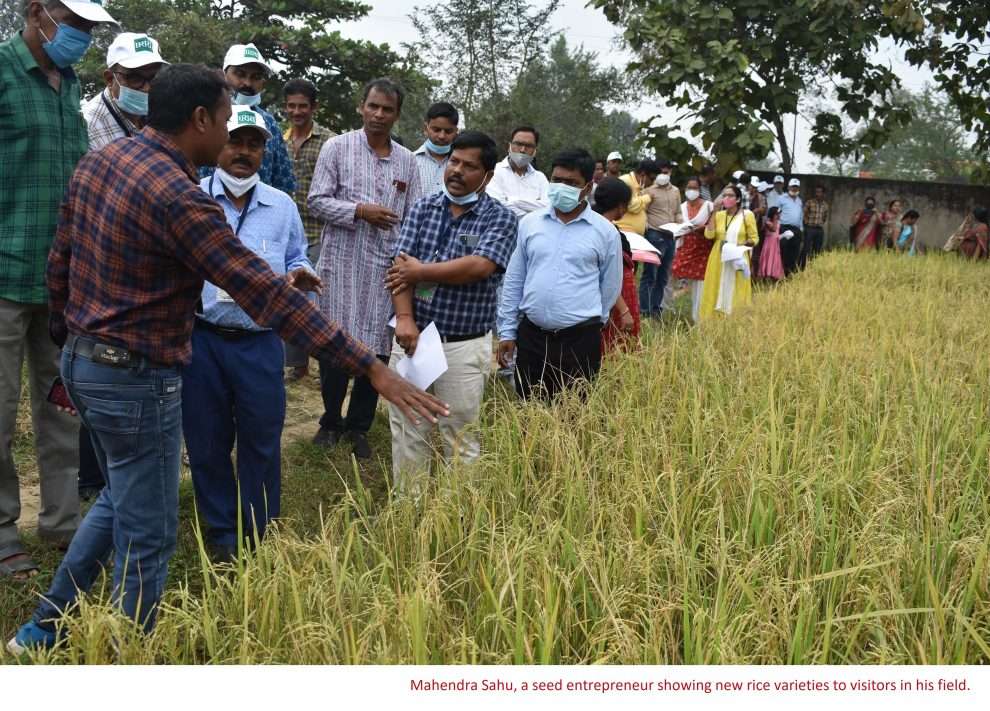

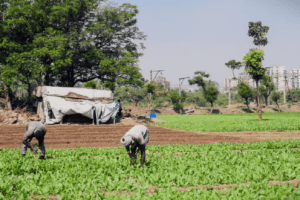

Thanks to authors and AESA for bringing fore, the very important and critical component of seed extension and entrepreneurship in improving productivity and farmers’ confidence in technology adoption. The case explained is very interesting in putting model process for emulating in rural farming situations integrated with research institutions for rapid field evaluation and crossing the chasm in adoption across farming community. Ensuring timely and required, access to modern varieties evaluated and traingulated in participatory mode and facilitated by team of scientists require field orientation, learning with society, refinement of extension approaches, quality feedback on technology performance and clarity in way forward as demonstrated in this blog. Interested to know how and why the farmers replaced the existing varieties of rice and also the role and decision of women farmers in this technology adoption process. Congratulations!